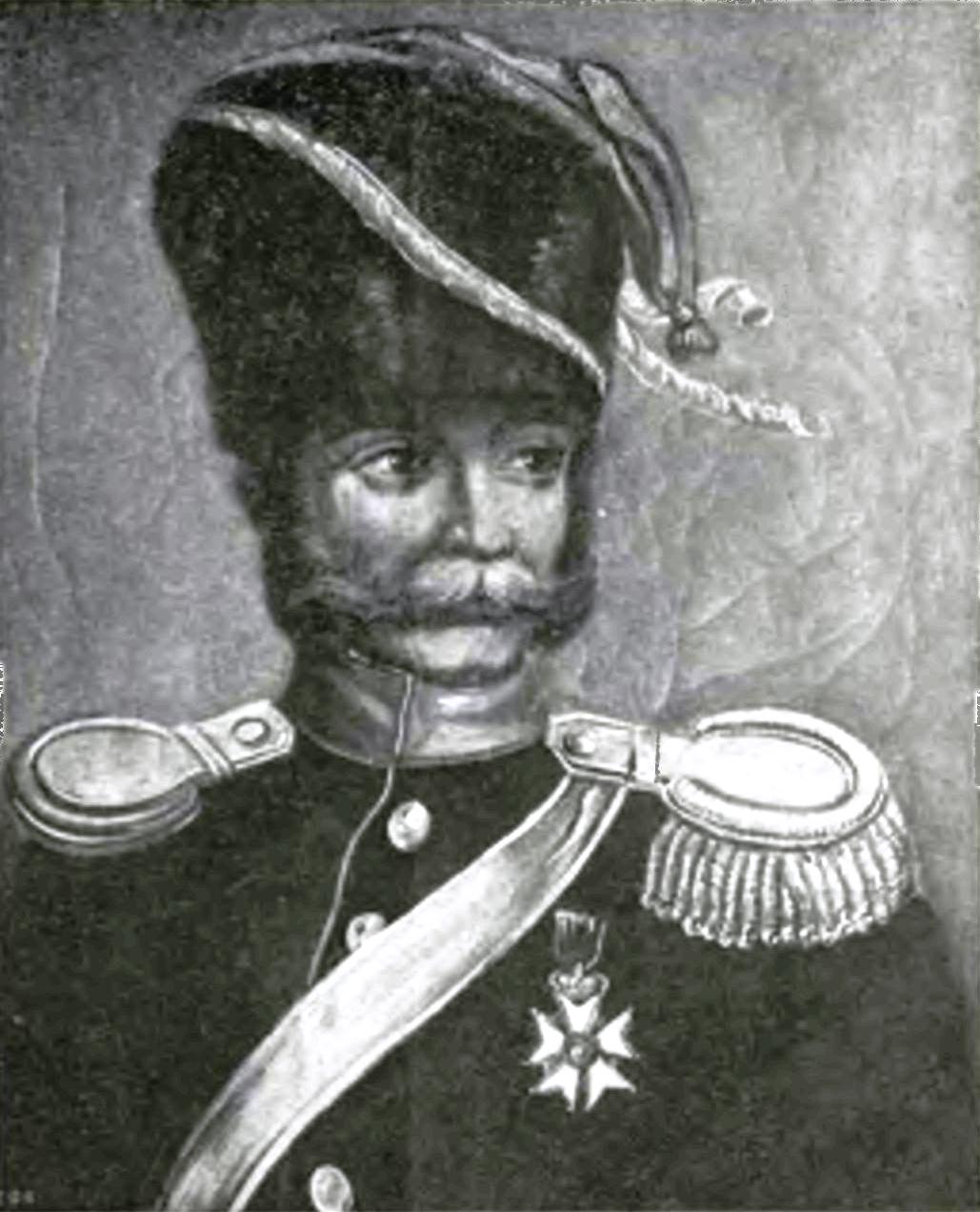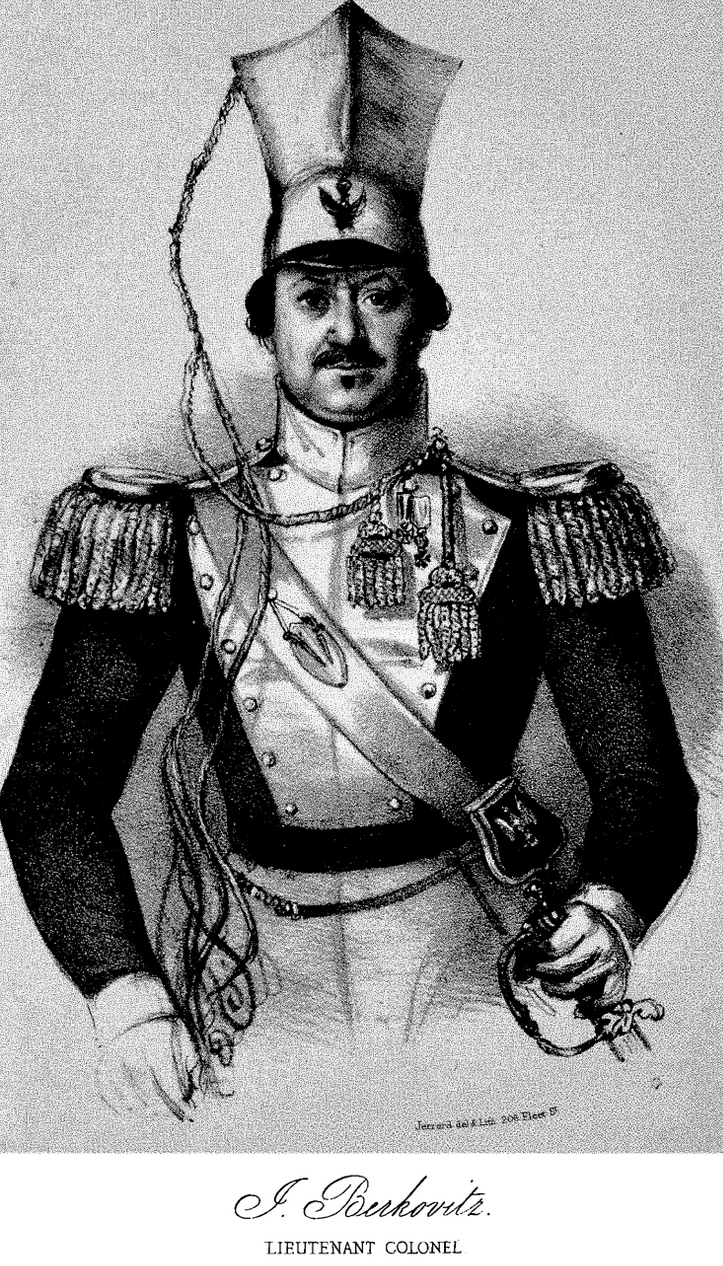BEREK JOSELEWICZ
(17 Sep 1764 - 5 May 1809)

According to most sources, Berek Joselewicz was born in Kretinga,
Lithuania around 1764. After receiving a traditional Jewish education,
he served as a faktor
(broker/agent) and arendarz
(leaseholder) for the Polish magnate Ignacy Massalski. His work
involved frequent travels and extended stays around Europe, and he is
reported to have learned French while staying in Paris around the time
of the French Revolution. Around 1788, he moved to the Praga
neighborhood of Warsaw, Poland with his wife, Rokhla, and became
involved in supplying the army.
Joselewicz's experience with the French Revolution and the
similarity in his views on equality with that of Tadeusz Kościuszko
are thought to have inspired him to participate in Kościuszko's
Uprising in late 1793. In 1794, he petitioned Kościuszko for the
formation of an all-Jewish cavalry unit, known as the Pułk Lekkokonny Starozakonny
(Orthodox Jewish Light Horse Regiment). After the regiment was
officially announced, Joselewicz and another Jew, Josef Aronowicz,
issued a call-to-arms in Yiddish that elicited more than 500 Jewish
volunteers. At the request of Joselewicz the commander, men in the
all-Jewish cavalry unit were allowed to practice religious customs,
including accessing kosher foods, abstaining from combat on the
Sabbath when possible, and growing their beards.
Unfortunately, the regiment saw terrible defeat during the Battle of
Praga, where Joselewicz was one of the few cavalry members to survive.
The fallen cavalry members were reportedly buried in the Jewish
Cemetery in Bródno.
After his defeat, Joselewicz moved to Lwow and attempted to form an
all Jewish volunteer troop within the framework of the Austrian army,
but his proposal was rejected. In 1797, he traveled to Italy to join
the Polish Legions under Henryk Dąbrowski, and saw combat in several
battles during the War of the Second Coalition.
During the Napoleonic Wars, Joselewicz commanded a sabre company of
Polish cavalry units fighting alongside French forces. With the
formation of the Duchy of Warsaw in 1807, he joined the Army of the
Grand Duchy of Warsaw as a squadron leader of the 5th Mounted Rifle
Regiment. In early 1809, Joselewicz's squadron was tasked with
clearing isolated regiments of Austrian troops and capturing crossings
over the Wieprz River in the name of the Duchy of Warsaw and its allies.
During clashes between Joselewicz's squadron with Austrian Hussars
stationed in Kock, the Austrian Hussars were forced to retreat, but
Joselewicz was killed during conflict. Historical sources surrounding
the circumstances of his death are unclear; an article published
by Ernest Łuniński in Tygodnik Illustrowany
in 1909, 100-years after his death, suggests he may have been trampled
by horses, but the article does not provide a source for this
information.

Berek's son, Josel Berkowicz, also fought in the Battle of Kock
in 1809, which occurred around the time he reportedly entered military
service. He later served as a squadron chief during the November
Uprising in 1830. He and his mother, Rokhla, reportedly received
military pensions from the Polish Government until 1831.
In his youth, he received a traditional Jewish education. In 1809, at 20 years old, he
joined the Army of the Duchy of Warsaw and took part in the war between the Duchy of Warsaw and Austria. He fought at
his father's side during the Battle of Kock, and also took part in the war with Russia in 1812 with the rank of lieutenant.
For his military achievements, he was awarded the Legion of Honor with
the Golden Cross and other decorations. He requested to be discharged from service around 1815 due to injuries received during the war, and subsequently worked as a forest warden in several areas of Poland for a few years.
In 1830, he took part in the November Uprising against Russian control of Congress Poland. Following the example set by his own father, he approached the leadership of the uprising under General Józef Chłopicki with a proposal to create a battalion of Jewish volunteers in support of the rebellion and subsequently issued a public appeal:
He issued several public appeals to Polish Jews to join his battalion, but was less successful than his father due to resistance from the Warsaw kehilla leaders; the rabbi of Kock at the time, Menachem Mendel Morgensztern, was supportive of the rebellion.
The uprising was ultimately unsuccessful, and his involvement resulted in exile. He reportedly lived in France from 1832 to 1836, when he moved to England. While living in England, he reportedly wrote a fictional account of his father’s story, which his sons published after his death in 1846 under the title Stanislaus, or the Polish Lancer in the Suite of Napoleon, from the Island of Elba. He died in England in 1846.